Leather Trade Group Protests Move to Synthetic Materials
Leather has become an increasingly contentious automotive production material as automakers look to go green and many groups lobby for animal-free supply chains. While many companies have shifted to sustainable materials and plant-based alternatives to animal hides, a leather trade group is fighting back. One 4 Leather says that cow leather has a lower carbon footprint than the alternatives, but that might not be enough to change minds.
U.S. Asks Mexico to Investigate Stellantis' Labor Practices
The United States has requested that Mexico investigate worker rights violations that were alleged to have taken place at one of the parts factories owned by Stellantis. Officials are curious about what’s been happening at Teksid Hierro de Mexico, a facility located in the border state of Coahuila that’s responsible for manufacturing iron casings, in regard to unionization. According to U.S. officials, this is the fourth such complaint under the United States-Mexico-Canada Agreement (USMCA).
Having supplanted the North American Free Trade Agreement (NAFTA) signed into law by the Clinton administration in 1993, USMCA sought to rebalance trade laws the Trump administration believed had disadvantaged the United States. However, it also sought to advance worker protections in Mexico and give employees an easier pathway toward unionization.
People's Convoy Rolls On Washington, Freedom Convoy Regrouping
On Wednesday, American truckers commenced a cross-country drive from California to Washington, D.C., to petition governments (local, state, and especially federal) to end all COVID-19 mandates. Known as The People’s Convoy, the group was inspired by the Canadian Freedom Convoy that was broken up over the weekend and effectively serves to spread its message within the United States.
The goal is to arrive in the capital early in March to pressure the Biden Administration into ending any formal federal emergencies pertaining to the pandemic. Defense Secretary Lloyd Austin has approved a request from the District of Columbia government and the U.S. Capitol police for 700 National Guard troops, widespread fencing, and 50 armored vehicles in anticipation.
Industry Begins Blaming the Bridge, Truckers in Ottawa
With the Ambassador Bridge having been cleared by police over the weekend, those protesting government mandates have literally been relegated to the sidelines. Canadian officers from a variety of departments, including Ontario Provincial Police, are now situated at relevant intersections and Windsor, Ontario, has declared a state of emergency in case demonstrators return.
But don’t think the story is over. The trucker blockade certainly caused trouble for the automotive sector and it suddenly seems interested in rolling the event into the industry’s ever-expanding list of excuses. Now that the rigs have all been removed, spokespeople have been chiming in and they’re being presented as rather single-minded on the matter. They want more assistance from the government to quash any protests that might impact their bottom line and are happy to have something else to blame for why the broader industry remains in such a pitiful state.
Freedom Convoy Update: Truckers Are Winning
The Freedom Convoy that originated in Canada last month has gained an incredible amount of momentum, garnering loads of support from citizens around the world. Sympathetic protests seem to be erupting everywhere while the original group of truckers remains planted on the streets of Ottawa to demand an end to government mandates. But honking at Parliament Hill for two weeks was only a portion of the convoy’s grand strategy.
Large groups of truckers have broken off to create blockades at meaningful border crossings, gaining control of North America’s already ailing supply lines. The most recent example resulted in the taking of the Ambassador Bridge in Detroit, an essential trade crossing for both the United States and Canada. Truckers have held the bridge for five days and automakers have begun announcing shutdowns due to supply issues. Meanwhile, the Canadian government has begun discussing an end to lockdown measures after failing to stop the protests and other nations appear poised to follow in its footsteps.
Setting the Stage? Mexican Auto Employees Elect Independent Union
When the United States-Mexico-Canada Agreement (USMCA) was being floated as a possible replacement for the North American Free Trade Agreement (NAFTA), one of the biggest selling points was the inclusion of new labor protections for Mexican workers. The Trump administration wanted to ensure serious labor reform took place south of the border to ensure union business was conducted responsibly and wages would increase. As a byproduct, USMCA is supposed to encourage North American synergies while gradually discouraging U.S. businesses from blindly sending jobs to Mexico to capitalize on poverty tier wages.
That theory will now be tested in earnest after General Motors employees from the Silao full-size truck plant voted overwhelmingly to dump the Confederation of Mexican Workers (CTM) for the Independent Syndicate of National Workers (SINTTIA).
Canada Joins Mexico in Trade Dispute Against United States
Mexican and Canadian officials have been dropping hints that they’re not all that enthusiastic about the United States-Mexico-Canada Agreement (USMCA) since before Enrique Peña Nieto, Donald Trump, and Justin Trudeau all sat down to sign it in 2018. But just getting to that point required months of formal negotiations that rarely looked to be all that productive.
Sadly, things don’t seem to have changed now that the USMCA is in full effect. Last week, Mexico requested a dispute settlement panel under the terms of the trade pact to help resolve disagreements about the surprisingly contentious automotive content stipulations that determine whether or not vehicles and parts will be slapped with tariffs. Under the previous North American Free Trade Agreement (NAFTA), 62.5 percent of the vehicle’s components had to be sourced from member nations to be considered tax-exempt. In an effort to spur localized production, USMCA increased that number to 75 and not everyone is thrilled with the updated content requirements with Mexico claiming it’s not even sure how to apply them. Canada now intends to formally sign onto Mexico’s complaint against the U.S. over their divergent interpretation of rules.
U.S. and Mexico Can't Come Together On Light Vehicle Rules
When the United States abandoned the North American Free Trade Agreement (NAFTA) to embrace the United States-Mexico-Canada Agreement (USMCA), it did so under the premise of crafting a better trade arrangement for itself. Established in 1994, NAFTA created a trilateral trade bloc that encouraged commerce between nations. But critics have accused it of encouraging the offshoring of U.S. jobs and dramatically suppressing wages — particularly within the automotive and manufacturing sectors.
Signed in 2018, and revised the following year, the USMCA was supposed to remedy those issues. But it’s been difficult to get all parties on board, especially when it comes to those persnickety rules of origin that stipulate how much of a vehicle’s hardware needs to be sourced from member nations.
Supreme Court Allows Auto Aftermarket to Access APIs
The Supreme Court ruled on April 5th in the Google v. Oracle case, a copyright dispute over software. Their decision was that application program interfaces (API) are fair use in building compatible components.
Ginetta Sports Cars Coming to America
Ginetta, a British race car manufacturer for more than 60 years, has opened Ginetta North America in South Boston, Virginia, to provide support for their motorsports customers across North America.
From their U.S. base, Ginetta will be able to not only market, distribute, and sell their sports cars, but grow their presence and the brand. Part of the expansion into North America included the acquisition of TMI AutoTech, a leader in low-volume sports car manufacturing in the U.S.
Auto Lobbyists Attempt to Soften USMCA, Look to White House [UPDATED]
Lobbyists are reportedly seeking to soften the United States-Mexico-Canada Agreement (USMCA) now that there are some new faces in the White House. Signed in 2018, revised in 2019, and effective since 2020, the USMCA sought to restore North America’s manufacturing base with new content requirements and place the United States in a more favorable position than it held under the North American Free Trade Agreement. But industry groups are now claiming that interpretations from government agencies are gumming up the works, and accusing the U.S. of having a different interpretation from what the other nations had originally agreed upon.
“[The USCMA interpretation makes] meeting the … content provisions that much more difficult for everyone to achieve,” stated David Adams, president of Global Automakers of Canada.
White House Presses Taiwan On Semiconductor Shortage
Automakers around the globe have been issuing warnings for weeks that the semiconductor shortage will eventually result in fewer cars and leaner profitability reports. But the absent chips are affecting just about every industry producing modern connected devices, creating fears that electronic prices could skyrocket as availability dwindles. Lockdowns effectively crippled semiconductor supply lines right as demand peaked and everyone is starting to get a little worried about how it’s going to impact production in other industries.
The White House is reportedly taking steps to mitigate the issue by tasking Brian Deese (Director of the National Economic Council) and Jake Sullivan (National Security Adviser) with coming up with a solution. It’s also asking embassies to assist chip suppliers around the world however possible and hopefully suss out a way to stop the global shortage. Meanwhile, Deese and Sullivan will be focusing the brunt of their efforts on Taiwan.
Tires Made in Southeast Asia Will Be More Expensive
Tires from South Korea, Taiwan, Thailand and Vietnam are about to get more pricey, as the U.S. Department of Commerce (DOC) announced yesterday preliminary duties in the antidumping duty (AD) investigations of passenger vehicle and light truck tires from those countries.
German Auto Lobby Wants Biden to Eliminate U.S. Trade Restrictions
Germany is eager to see the United States abolish trade barriers implemented by President Donald Trump now that it looks like Joe Biden has won the 2020 election. While that could all be undone by the sudden influx of legal actions taken by the Trump campaign as presumptive evidence of election impropriety streams in, Germany would still like to get the ball rolling on trade with the Democrats.
The nation’s automotive industry is petitioning leadership in the U.S. and European Union to align technical/regulatory standards and minimize the existing trade barriers. The German Association of the Automotive Industry (Verband der Automobilindustrie) or VDA has already endorsed the proposal with the lobby group’s president confirming its position in a recent webcast hosted by the Frankfurt business media club ICFW (Internationale Club Frankfurter Wirtschaftsjournalisten).
Trade War Watch: Report Claims White House Wants to Dictate Where Cars Are Manufactured
The Trump administration has reportedly expressed an interest in deciding where and how automotive manufacturers do their business if they want to secure duty-free deals under the United States–Mexico–Canada Agreement (USMCA) that’s positioned to replace NAFTA. According to Bloomberg, there’s currently a discussion taking place between administration officials, congressional staff, and domestic and foreign automakers regarding the context of the legislation that lawmakers will ultimately have to vote on. The White House is said to want highly specific language that would allow it to select production rules unilaterally.
Considering how messy things have gotten with China, it could be useful to have extremely clear trade language and some direct oversight of businesses with global interests. But critics are worried the strategy could bring U.S. trade policy closer to the rigid policies already in place in the People’s Republic — a country America has attempted to distance itself from due to its ludicrous levels of government intervention.
The real fear is that the government could use this to give one manufacturer better treatment than another — cutting it a sweet deal for building in a politically advantageous area, for example. While plausible, we can’t confirm something that’s largely speculative.
Trade War Watch: Automotive Tariffs and the European Union
It’s been nearly a year since President Donald Trump and European Commission President Jean-Claude Juncker kissed and negotiated a temporary truce aimed at buying the United States and the EU time to renegotiate their positions without fear of new tariffs.
Unfortunately, it seems everyone had better things to do following the smooch.
U.S. Trade Head to Meet With UAW This Week Over New Trade Deal
U.S. Trade Representative Robert Lighthizer will be in Michigan this week to meet with union leaders from United Auto Workers in a bit to gain their approval for the Trump administration’s new North American free trade deal. Lighthizer is scheduled to meet with union officials in Dearborn on Tuesday to answer questions about the United States-Mexico-Canada Agreement (USMCA) while simultaneously drumming up support.
The USMCA deal suggests increasing existing requirements for North American content for vehicles, stipulating that 40 percent of a vehicle’s overall content be manufactured in areas paying at least $16 an hour, while also encouraging Mexico to tailor its labor rules to allow unions to wield legitimate collective bargaining powers.
Trade War Watch: Congress Tries a New Tactic to Block Auto Tariffs
With the United States’ government shutdown now over, lawmakers have an opportunity to work together as promised. Interestingly, one of the first pieces of bipartisan legislation to emerge after the federal bureaucracy resumed operations involves a plan to severely limit presidential authority to impose tariffs for national security reasons.
The Bicameral Congressional Trade Authority Act, introduced by Senators Patrick Toomey (R-PA) and Mark Warner (D-VA), along with House Representatives Mike Gallagher (R-WI) and Ron Kind (D-WI), would require the president to get approval from Congress before taking any trade actions based on national security threats. If passed into law, the bill would let the Legislative Branch effectively block the tariffs being proposed by the Trump administration on automobiles and automotive parts.
Automakers Understandably Freaking Out Over 'No Deal' Brexit
With Britain’s parliament rejecting Prime Minister Theresa May’s latest Brexit deal, European automakers stand to face some strong headwinds in the near future. As of now, no clear path lies ahead. Many believe the European Union will continue playing hardball, punishing Britain for leaving. But, even if it doesn’t, loads of regulatory and trade issues must be resolved in short order to avoid problems.
There’s also no shortage of hyperbole surrounding the issue. Just this morning I heard cable news call it “the largest crisis in Britain’s history,” as if World War II never happened. A channel away, another outlet proclaimed how splendid it would be for trade between the United Kingdom and United States.
Regardless of which side of the fence you fall, there’s more at stake here than Theresa May’s job. Automakers, who like consistency above all else, worry a no deal plan for “British independence” could be tantamount to flipping the industry table. They don’t like being caught up in the uncertainty surrounding Brexit, and there appears to be an endless list of issues to contend with.
Rapide Attempts To Vanquish Brexit: Aston Martin Stockpiling Cars in Germany
Brits have now been grappling with their Brexit situation for what now seems like an interminable amount of time, with no shortage of digital ink and political hot air spilled about the subject.
Looking past all the posturing, however, a disorderly departure from the EU could contain serious ramifications for companies making products in Britain, and fancy-pants Aston Martin has initiated a contingency plan to handle a “no deal” Brexit. Prepping for a worst-case scenario, the company is stockpiling cars in … Germany.
Trade War Watch: China to Temporarily Suspend U.S. Auto Tariffs
China announced Friday its intent to reduce tariffs on imports of American-made cars as it tries to negotiate a trade deal with the United States. As you’ll recall, the People’s Republic imposed additional punitive tariffs on U.S. cars and auto parts earlier this year after promising it would lower the trade barriers on a global scale.
Things look to be different this time around. China has already taken steps to scale back the trade war and appears ready to continue down that path. Earlier this month, President Donald Trump and Chinese President Xi Jinping agreed to a truce in the trade war at their meeting in Argentina. This was followed by an announcement, via Trump’s Twitter account, claiming China had agreed to scale back auto tariffs against the United States.
Europe Will Punch Back Against Any U.S. Car Tariff: EU Trade Commissioner
It’s been a trade-heavy week. Earlier, the White House decided to postpone any major tariff decisions following a discussion with the Commerce Department over a draft report on the impact of auto imports, giving trade representatives from the United States and European Union room to talk.
Unfortunately, things don’t appear to have gone swimmingly. European Trade Commissioner Cecilia Malmström left her Wednesday meeting with U.S. Trade Representative Robert Lighthizer promising that the EU would have retaliatory tariffs at the ready if America pulls the trigger on auto import duties. However, she also said some progress was made during her talk with Lighthizer, but had nothing conclusive to announce
Negotiating with the EU has grown difficult and, frankly, the automotive aspects have become less important of late. The European Union is now discussing the possibility of creating its own army, leaving president Trump to tweet angrily about historical precedents.
Trade War Watch: Trump Reportedly Delaying Auto Tariffs, Clock Still Ticking
The Trump administration was supposed to make an announcement Tuesday as to whether or not imported automobiles pose a national security risk, following discussions with trade representatives. While it wasn’t presumed that the White House would say anything truly definitive or hold a formal press conference on the issue, it was assumed that the president would take a stronger public stance either for or against an earlier proposal to raise foreign auto import tariffs to 25 percent. And it has, in a way.
According to those familiar with the matter, the White House decided to postpone any major decisions after discussing a draft Commerce Department report on the impact of auto imports with trade reps. However, the administration doesn’t have forever to make up its mind. Nor does its trading partners, which could be the point.
Trade War Watch: Ford Blames Trump for Sky-high Steel Prices
Ford Motor Co. is blaming Donald Trump’s commodity tariffs for elevating U.S. steel prices higher than any other market on the planet. Regardless of your opinion on the president’s policies (the economy is reportedly booming), it’s a little hard to rebuff Ford’s criticisms on this one. The automaker’s now going straight to the source in an attempt to remedy the situation.
Trump hasn’t gone easy on Ford. He spent a large portion of his presidential campaign coming down on the automaker over its plan to move small-car production to Mexico. However, the company’s about-face proved a short-lived victory — it ultimately decided to stop selling cars altogether. This was followed by Ford’s cull of the upcoming Focus Active in North America after Trump’s 25 percent levy on Chinese-built vehicle made the introduction impossible (and unprofitable).
Car, Parts Companies Exhale, but Not Everyone's Thrilled by USMCA
Canada’s autoworkers feel pretty confident they’ll still have a job next year, as the free trade agreement reached by the U.S. and its northern neighbor Sunday night pretty much keeps the status quo alive in that country’s auto sector.
Just last week, with headway essentially absent from the trade negotiations, President Trump repeated his threat of levying a 25 percent import tax on Canadian vehicles. Such a tariff could easily have seen 160,000 jobs erased from the auto and parts manufacturing industries; perhaps more.
However, just because the industry came out all right in the end doesn’t mean the future is entirely rosy.
NAFTA Is Dead; All Hail the USMCA
Following some furious 11th hour bargaining, Canada reached an agreement with U.S. trade negotiators Sunday night, marking the end of the North American Free Trade Agreement (NAFTA) and the creation of its successor, the U.S.-Mexico-Canada Agreement. USMCA, for short.
While some of the finer details have yet to be released, the trilateral trade deal prevents the nightmare scenario of heavy tariffs levied on vehicles imported from Canada. To keep General Motors, Fiat Chrysler, Ford, Honda, and Toyota plants humming, officials in the Great White North reluctantly offered up some milk and cheese.
Amid Cross-border Feud, a Pricier Dodge Challenger Looks More Likely Than Ever
Man, if you live south of the 49th parallel, you missed quite a hubbub yesterday evening. Actually, Americans likely caught a whiff of it, as U.S. President Donald Trump’s lengthy post-UN press conference Wednesday covered a lot of topics, including the one that had Canucks up in arms.
Up here in the Great White North, a country some commenters would prefer to never see mentioned (as this writer apparently mentions it ALL THE TIME), trade remains an understandably hot topic. Canada hasn’t reached a renegotiated free trade agreement with the U.S., unlike Mexico, and there’s a Sunday deadline looming to sign on to the U.S.-Mexico accord. Tick tock. Among other planks, Canada wants to protect its dairy cartel — an entity not universally loved up here, as it greatly increases the price of common food staples on store shelves. However, protecting jobs in that sector means risking jobs in the larger auto sector, a crucial industry whose vehicles Trump has threatened to tax to the tune of perhaps 25 percent. Auto parts could see a 10 percent tariff.
Canada exported $48.8 billion worth of vehicles in 2016.
Toyota, Honda, and the Detroit Three all have assembly plants in Ontario. Last night’s news conference brought nothing but worry to the nearly 200,000 people employed in the vehicle and parts manufacturing sector. What would it mean if Trump pulls the tariff trigger? And is Canada blameless in not yet reaching a deal?
Trade War Watch: Canada Says It'll Take Its Time Reaching a Deal; Japan's Up for Talks
Canadian Prime Minister Justin Trudeau ignored mounting pressure from the United States to quickly agree to a new NAFTA deal on Wednesday. Trudeau indicated it was possible for the three nations to maintain a trilateral agreement, but noted his priorities would always align with what’s best for Canada. The nation now seems fine with ditching the agreement altogether.
Meanwhile, U.S. President Donald Trump announced that an agreement reached with Japanese Prime Minister Shinzo Abe allows the two countries to begin trade negotiations. The focus of these talks will likely be automotive in nature. Trump has remained oddly fixated with convincing Japan to sell more American-made models ever since taking office, and the Land of the Rising Sun doesn’t want itself saddled with import tariffs.
As Ford Takes a Hit, Hackett Appeals to Trump to End Trade Disputes
Ford’s decision to construct the current-generation F-150’s body purely of aluminum paid off in terms of lightweighting, fuel economy, and sales, but rising commodity costs over the past couple of years eroded some of the financial benefit. There’s far greater headaches facing Ford these days, as the industry grapples with tariffs on not just imported aluminum and steel, but vehicles as well.
A second income-sucking tariff hit in July, when the U.S. applied an import duty of 25 percent on a slew of Chinese goods, prompting China to up its own tariffs on American goods, including automobiles. Ford isn’t having it. Having already lost $1 billion in profit, CEO Jim Hackett has a message for President Trump.
Lighthizer: U.S. Won't Bother Waiting for Canada on New NAFTA Pact
U.S. Trade Representative Robert Lighthizer has said the United States will begin moving forward on its bilateral trade deal with Mexico at the risk of leaving Canada behind.
The nation was already given until the end of September to reach an agreement that would effectively maintain the existence North American Free Trade Agreement, but has not indicated satisfaction with the current terms. Unfortunately, the U.S. wants to ensure a deal is in place before the next Mexican president assumes office — giving it precious little time to spend on Canada after the last year’s worth of negotiations proved ineffective.
“If we push it beyond [October 1st], then we have a new negotiation with Lopez Obrador and we don’t know where that would go at all,” Lighthizer said. “It would be unfair to all the people that have been involved — certainly the U.S. workers, farmers and ranchers — to start a new negotiation with a new president of Mexico.”
A U.S.-launched Trade Dispute Is Helping Toyota in One Key Market, but for How Long?
While the trade situation is still very much in flux, Toyota sees itself as standing to gain from the turmoil, just not in the United States. The automaker, along with other Japanese brands, finds itself in an advantageous position in China — a massive market facing its own troubles.
China’s anger at the U.S., and vice versa, could mean big bucks in the short term for Toyota.
Trade War Watch: NAFTA Window Almost Closed, Canada Still Isn't Interested
The United States is getting extremely close to having to move forward on its NAFTA deal with Mexico without Canada, according to White House economic adviser Kevin Hassett.
“I’m a little surprised that the Canadians haven’t signed up yet,” Hassett said in an interview with Fox News. “I worry that politics in Canada is trumping common sense because there’s a very good deal that was designed by Mexico and the U.S. to appeal to Canada. And they’re not signing up and it’s got everybody over here a little bit puzzled.”
On Thursday, Canadian Foreign Minister Chrystia Freeland and U.S. Trade Representative Robert Lighthizer met in Washington to discuss terms. However, no agreement was reached.
Ford Snatches Away the Focus Active, Leaving Future Low-end Buyers With the EcoSport and What Else?
U.S. Ford Focus production ended in May, but the automaker planned to import the next-generation Focus Active, a slightly lifted, mildly cladded five-door, in order to have something to sell to entry-level buyers. With the subcompact Fiesta ceasing production early next spring and the Fusion following it a couple of years later, that left very little low-end product for new or returning customers.
Well, scratch a crossoverized Focus off your shopping list. The automaker now says the Focus Active will not arrive on these shores in the latter part of 2019, or any date after that.
After learning this, how many of you are now pricing a three-cylinder, FWD EcoSport? Anyone? Hello?
Trade War Watch: Trump Rejects Auto Tariff Deal With Europe
Earlier this year, President Donald Trump took a renewed interest in European tariffs after deciding he didn’t like what he saw. He argued it was time for the United States to consider a fresh tax on vehicles manufactured in the European Union to level the playing field. “If the EU wants to further increase their already massive tariffs and barriers on U.S. companies doing business there, we will simply apply a tax on their cars which freely pour into the U.S.,” he wrote in March.
A few months later, America floated the ridiculous-sounding proposal of abolishing all automotive tariffs between the U.S. and EU. Surprisingly, Europe was highly receptive. German Chancellor Angela Merkel even directly addressed the issue by saying she would support lowering EU tariffs on U.S. car imports. The European Union now seems willing to pursue a zero-tariff solution on automobiles.
However, Trump has since changed his tune. The new rhetoric coming from the White House is that the deal, which was originally pitched by the U.S., is no longer good enough.
NAFTA No More: U.S. Reaches Deal With Mexico, Puts Pressure on Canada [Updated]
President Donald Trump announced a trade “understanding” with Mexico on Monday — not to be confused with an official deal — that would lead to an overhaul of the North American Free Trade Agreement. Trump made the announcement from the Oval Office, with Mexican President Enrique Pena Nieto listening in by speakerphone.
While it’s still too early to show up in a Lockheed S-3 Viking and tell the world “mission accomplished,” the announcement is the most overt example of progress on NAFTA we’ve seen. Interesting, considering it seemed as if Trump was openly calling for its death during the meeting.
Earlier in the day, Mexican officials said trade talks with the U.S. had concluded, adding that an announcement could come later in the day. The White House confirmed the reports an hour later on its government website, with Donald Trump stating there was a “big deal looking good with Mexico” via twitter.
Apparently, Everyone Negotiating NAFTA Is a Child
If you’re anything like this author, you’ve probably abandoned discussing the North American Free Trade Agreement in your personal life. That’s not because it stopped being important, but rather due to the fact that none of the three countries involved seem capable of making any sort of progress.
Presently, the United States and Mexico are focusing on rules associated with automotive production. However, after two days of non-stop negotiation, Mexican Economy Minister Ildefonso Guajardo said the two sides haven’t resolved their differences on the pending issues. Now Mexico says it won’t consider further negotiations until Canada agrees to a deal.
Here’s where things get remarkably shitty. Canada has already explained that it’s waiting for the U.S. and Mexico to strike a deal of their own. “If they can resolve their differences on [automotive trade], then I think we can move ahead and have the three of us talk about some of the other issues that affect all of us,” David MacNaughton, Canada’s ambassador to the U.S, said in an interview earlier this month.
Trade War Watch: Turkey Readies 120 Percent Tariff On American Cars
In Joseph Conrad’s Heart of Darkness, Kurtz has an epiphany regarding himself, imperial conquest, and war as a whole, crying “The horror! The horror!” in his last moments of life. His experiences took him from a well-meaning businessman to a megalomaniacal warlord, only able to realize the full scope of his own corruption upon his death. Trade wars contain significantly less drama than real ones, but there is never a shortage of egotistical individuals falling down a rabbit hole of madness.
This week, a decree signed by Turkish President Recep Tayyip Erdogan raised the tariff on U.S. cars to 120 percent. While this doesn’t qualify as truly horrific, it certainly could head in that direction if things continue to escalate.
Three's Company, Too? Canada Returning to NAFTA Dance As U.S. and Mexico Approach Auto Deal
Canada says it could rejoin the NAFTA discussion, just as the United States and Mexico approach an agreement on automobiles. The two nations engaged in bilateral negotiations a little less than a month ago, seemingly making positive headway on a trade deal.
With President-elect Andrés Manuel López Obrador assuming office in December, it’s in the United States’ best interest to close a deal as soon as possible. It’s assumed the man, frequently referred to as “AMLO,” will make sweeping changes to the Mexican government. However, he also promises to join forces with several smaller parties from both the right and left to create a coalition aimed at rooting out corruption. The resulting level of uncertainty has many fearing difficult Mexican policy changes and trade negotiations in the future, effectively forcing a restart of NAFTA talks.
According to David MacNaughton, Canada’s ambassador to the U.S., the duo are close to finalizing a deal on automotive manufacturing. If so, the Northern nation is prepared to rejoin negotiations.
In a Worse-case Trade Scenario, Buick's Fate Hinges on a Tiny Crossover
The second quarter of 2018 returned pleasing sales figures for General Motors, but there were no champagne corks popping over Buick’s performance. While GM’s sales rose 4.6 percent compared to Q2 2017 (and 4.2 percent year-to-date), Buick sales headed in the opposite direction — down 12 percent in the quarter, and roughly six-tenths of one percent over the first half of the year.
Swirling menacingly in the background of all of this is a threat from President Trump to levy a 25 percent tariff on all automotive imports, a move that would leave Buick especially exposed. As numbers crunched by Automotive News show, the only thing sparing the brand from an emergency overhaul, should such a scenario come to pass, is a subcompact crossover — one which may or may not be exempt from the proposed tariffs.
Trump Puts Hold on New Auto Tariffs; Trade Negotiations Commence With Europe
President Donald Trump agreed on Wednesday to refrain from imposing car tariffs while the United States launches negotiations to cut other trade barriers with the European Union. After a meeting at the White House, Trump and European Commission President Jean-Claude Juncker agreed to begin talks that would also seek to resolve U.S. tariffs on steel and aluminum, as well as retaliatory duties from Europe.
It’s the first lull we’ve seen in the trade war in a while. Meanwhile, Chinese trade relations remain as bitter as ever.
Battle on the Border: We'll Fire Back If You Pull the Trigger, Canada Tells U.S.
The thought of the U.S. imposing an import tax on Canadian vehicles and auto parts was once unthinkable, but the possibility now exists. Unable to ignore it any longer, Canada now says it will impose tariffs on American-built vehicles should the U.S. act first.
Canada’s contribution to the continent’s automotive landscape isn’t what it once was, but it’s still formidable when viewed in isolation. The Great White North, which continued building Studebakers for two models years after South Bend went dark, houses assembly plants operated by the Detroit Three, Honda, and Toyota.
With the glaring exception of pickup trucks, Canada would find itself with a (limited) crop of remarkably practical tariff-free vehicles if the taxes went into effect.
PSA Really Wants to Get You Into a Peugeot or Citron, but U.S. Fans Had Best Cross Their Fingers
PSA Group has a North American headquarters in Atlanta and it wants to use it. The French automaker also has a reentry plan that’s already underway. By the middle of the coming decade, we could all be behind the wheel of a French car (presumably after trading our Dodge Grand Caravans for the Citroën SpaceTourer Rip Curl).
Well, that might not happen — not if the U.S. imposes tariffs on the European Union, anyway. PSA North America Larry Dominique seems pretty worried that President Trump’s eagerness for tariffs could kibosh the company’s return, leaving mournful American francophiles gazing lustily over the Canadian border as PSA goes wild in Quebec.
Trade War Watch: As Commerce Secretary Ponders Auto Tariffs During D.C. Hearing, Automakers Call Out the Troops
As the United States considers imposing new tariffs of up to 25 percent on imported automobiles and parts, the industry has rallied together to stand against the proposal. Manufacturers already made individual cases for themselves and are now dropping very bleak-sounding industry projections on the U.S. Commerce Department in the hopes of changing the administration’s mind.
However, President Donald Trump continues to promote the imposition of tariffs to force a sort of economic justice. For years, China’s protectionist policies regarding automobiles forced American manufacturers to build inside its borders and partner with Chinese firms for years. That’s something Trump claims could be a national security risk. China also recently upped its tax on American-made autos to 40 percent, shortly after promising to lower them. Meanwhile, Europe still holds a consistently higher tariffs on imported cars than the U.S., except for light trucks.
Commerce Secretary Wilbur Ross seems aware that China may have gamed the system in its favor, but appears less convinced that it’s a matter of national security. On Thursday, during a hearing on the probe into the industry, he said it was “too early” to say what the United States would do. Meanwhile, auto groups continue to make their terrifying case. (There’s also quite a bit of rolling PR in downtown D.C. today, as you’ll see below.)
Volvo's Already Shuffling Production to Avoid Tariffs
Unlike Volvo’s S90 sedan, which is built half a world away from its V90 wagon stablemate, the Chinese-owned Swedish automaker has some flexibility in where it sources its XC60 crossover. Two plants — one in China, one in Torslanda, Sweden — crank out the second-generation utility vehicle, but the U.S. market gets its full share from the Orient.
After the Trump administration imposed a tariff of 25 percent on Chinese-built vehicles, Volvo’s XC60 suddenly found itself dragging a financial anchor. Hardly a great situation for a model that outsold all other Volvos in the U.S. last month. To side-step the tariff, Volvo’s already making changes.
Say goodbye to the Chinese XC60.
U.S. Gives German Auto Industry Zero-tariff Proposal, Merkel Receptive
The fresh threat of new automotive and parts tariffs from the United States has everyone up in arms. We recently published an exhaustive list of comments manufacturers and local governments made to the U.S. Commerce Department. They, along with suppliers, universally despise the idea and are doing everything in their power to convince the Trump administration to reconsider. Many are even discussing the grim prospect of layoffs and suspending investments.
However, the president remained firm on doing whatever it takes to bolster domestic production and U.S. automotive exports while the world tried to make sense of his strategy. Was this a madman playing hardball and gambling with the industry’s future, or the work of a master dealmaker forcing others to come to the table? Perhaps a little of both?
Earlier this week, the U.S. ambassador to Germany told German car executives that President Donald Trump would suspend threats to impose tariffs on cars imported from the European Union if the European Union lifts duties on U.S. cars. But the wildest part of all of this is that both the automakers and the German government seem to be in support of it.
Whatever Trump Decides, Fiat Chrysler's Prepared for What Comes Next
Without a functional plan, each episode of the A-Team would have ended with four funerals. For Fiat Chrysler, however, the solution to its problem doesn’t involve welding armor plating to a series of scrapyard vehicles while the guy from Breakfast at Tiffany’s lays down covering fire with a Ruger Mini-14.
FCA’s main concern involves the current occupant of the White House, and what his proclamations could mean for the automaker’s bottom line. A 25-percent tariff on imported vehicles could erase nearly a billion dollars in profit each year.
Don’t worry — FCA’s working on a plan.
Trade War Watch: U.S. Preparing to Limit Chinese Investment
The Trump administration is planning to impose incredibly restrictive investment limits against China. While the barriers could be argued as fair, considering China has some pretty serious restrictions of its own, the timing isn’t great. Treasury Secretary Steven Mnuchin pursued a less confrontational approach toward China after the nation showed some lenience in earlier promises to open its automotive and tech sectors through reduced tariffs, eventually eliminating state-mandated joint partnerships.
This move will no doubt make his job a lot more complicated.
It seems that the limits would restrict certain Chinese companies from investing in U.S. technology firms and block additional tech-related exports to Beijing. Among the industries most affect are robotics, aerospace, and automobiles — which have been labelled by the administration as a threat to economic and national security.
U.S. to Hit Chinese-built Vehicles With 25 Percent Tariff; China Fires Back
Just in time for the weekend, an escalation in the ongoing trade wars has seen the Trump administration announce a 25 percent tariff on $50 billion worth of goods imported from China. These tariffs include automobiles. For its part, China retaliated by applying a further 25 percent tariff on a similar amount of American goods, including automobiles.
The move comes less than a month after China announced a plan that would lower import duties and eventually allow foreign automakers to set up shop without a joint Chinese partner. Of course, that was then, and this is now.
Trade War Watch: Japan Gets Vocal Over U.S. Tariff Threats
While the Japanese government has walked on eggshells when discussing trade issues that are transforming the globe into an angry beehive, the nation’s automakers have been more forthright. However, they’re both getting increasingly vocal as the situation escalates.
As the United States and Japan head into trade discussions scheduled for July, it’s beginning to look like everyone will come out swinging — especially when it comes to the automotive industry. Last month, the White House launched a national security investigation into car and truck imports that could lead to new tariffs on some of Japan’s biggest U.S.-bound exports.
Japanese Finance Minister Taro Aso was uncharacteristically negative toward the current U.S. trade policy during a Group of Seven finance leaders’ gathering held last week. “It’s deeply deplorable,” Aso said. “Inward-looking policies involving one-sided, protectionist measures benefit no country.”
Looks Like NAFTA Renegotiations Aren't Happening This Year
Governance is one hell of a slippery fish. While you want your elected officials to assist in helping the nation evolve with an ever-changing society, you don’t want a deluge of contradictory and ill-planned laws mucking things up. That’s why the best progress is carefully measured and negotiated. But something has to happen eventually or you begin wondering what we (and the various lobbies) are paying these dingbats the big bucks for.
For example, the North American Free Trade Agreement looks like it’s about to be abandoned until sometime after 2019. After negotiations missed numerous self-imposed deadlines, U.S. House Speaker Paul Ryan said Congress needed a notice of intent to sign by roughly May 17th if anything was to be finalized for 2018. That date came and went. Now, everyone appears to have thrown their hands up, with practically every country on the planet currently considering retaliatory tariffs against the United States.
French President Convinced Trump Wants to Kill German Cars; Steel Tariffs Strike U.S. Allies
There’s been quite a bit of the old “he said, she said” as the global trade war between developed nations coalesces. Germany has not covered U.S. President Donald Trump’s trade policy favorably, not that it has much reason to. His new tariffs on imported steel and aluminum has tested relationships with numerous countries and, while it isn’t the biggest exporter of metal to the United States, Germany has something to lose. Likewise, proposed duties on passenger vehicles have sincerely rubbed Deutschland the wrong way.
However, the issue was further complicated this week after a gossipy report surfaced claiming Trump told French President Emmanuel Macron in April that he would continue hampering the European auto manufacturers until there are no Mercedes-Benz vehicles driving in America.
Trade War Watch: U.S. Public to Have a Say on Auto Import Threat
There was a mighty blowback against the Trump administration’s suggestion to elevate tariffs to as much as 25 percent on all foreign-built passenger vehicles.
Already reeling from fresh import fees on aluminum and steel, Europe expressed its collective distaste on new taxes while Japan vowed to plead a strong case for itself. Meanwhile, prominent politicians and two of the largest automotive trade groups in the country came forward to condemn the plan, stating it was “confident that vehicle imports do not pose a national security risk” to the United States.
While the administration has already launched its investigation to determine whether vehicle and auto part importers threaten the industry’s health and ability to develop advanced technologies, the government noted that a second opinion wouldn’t hurt. Announced on Tuesday in the Federal Register, the the Commerce Department will allot two days in July for public comments on the matter.
Trade War Watch: Automakers Respond to U.S. Import Investigation, Japan Keeps the Faith
President Trump announced a security investigation into auto imports last week, tasking Commerce Secretary Wilbur Ross with the job. His goal will be to determine what effects imported vehicles have on the national security of the United States under Section 232 of the Trade Expansion Act of 1962 — which sounds like a monumental and rather complex task.
Basically, Ross will examine whether or not the U.S. can get away with escalating automotive tariffs. That’s a touchy subject, considering how contentious global trade has become in recent months. Worse yet, the 80-year-old commerce secretary will have to continue promoting American businesses and industries outside its borders while deciding on an issue few trade partners will be happy with.
Automakers aren’t thrilled either. After Trump announced the investigation, the Association of Global Automakers and Alliance of Automobile Manufacturers both said they didn’t believe vehicle imports posed a national security risk. “To our knowledge, no one is asking for this protection. If these tariffs are imposed, consumers are going to take a big hit,” said John Bozella, President of Global Automakers, in a statement. “This course of action will undermine the health and competitiveness of the U.S. auto industry.”
Trade War Watch: China to Reduce Import Tariffs for Cars and Components
China has announced plans to slash import fees on automobiles to 15 percent starting this July. While the tariff currently rides high at 25 percent, the country’s Ministry of Finance said reducing it was part of an intentional effort to open up China’s markets and spur development within the local automotive sector.
It may also have been part of a peace offering. President Donald Trump has been pretty clear on China’s trade policies with the United States, frequently referring to them as unfair. The U.S. imposes a svelte 2.5 percent fee on imported vehicles — unless we’re talking about trucks. “Does that sound like free or fair trade?” Trump tweeted last month. “No, it sounds like STUPID TRADE — going on for years!”
Bet You Forgot Today Was the NAFTA Deadline
If you forgot today was the deadline for finalizing North American Free Trade negotiations, don’t worry, so did practically everyone else. In fact, the whole affair is starting to feel like that old car that’s been sitting in your friend’s yard for far too long. He keeps telling you he’s going to fix it up and make it better than new. “This is the summer,” he says. But you know he’s just going to keep mowing around it while it continues to rust and collect mice, so you’ve tried to push it out of your mind.
Like the restoration, the entire concept of a deadline for the trade deal is rather arbitrary at this point. NAFTA’s initial target date for an agreement between the three countries was March 31st, roughly one year after negotiations began. The May 17th deadline was claimed by U.S. Speaker of the House Paul Ryan, who said Congress had to be notified under the Trade Promotion Authority statute.
“We need to receive the notice of intent to sign soon in order to pass it this year,” explained Ryan’s office. “This is not a statutory deadline, but a timeline and calendar deadline.”
Basically, Congress wants to influence the president and NAFTA negotiators to conclude talks swiftly and reach an agreement before midterm elections. But Mexican officials warned everyone not to get their hopes up. “The possibility of having the entire negotiation done by Thursday isn’t easy, we don’t think it will happen by Thursday,” said Mexican Economy Minister Ildefonso Guajardo earlier this week.
Here's How Trade Negotiations Are Looking for the Month of May; Steel Tariffs Stalled Through June
May kicked off with a bundle of trade deals going into hibernation mode. After some legitimate — albeit quaint — progress, NAFTA decided to take a break this week. Currently, U.S. Trade Representative Robert Lighthizer is in China to circumvent that brewing trade war and is unable to commit himself to the North American Free Trade Agreement’s renegotiation.
That’s probably fine, because Mexico’s auto reps need time to cool off.
The United States’ most recent proposal for increasing NAFTA’s regional automotive content includes a four-year evolvement to meet a 75-percent regional value threshold. It also suggests new labor rules requiring “substantial work” to be set at wages of $16 an hour or more. The move is intended to help the U.S. and Canada bolster production and force Mexico to raise its own wages.
A significant portion of Mexican trade officials aren’t keen on either aspect, resulting in a mixed response overall.
All About Imports: Chinese President Tries to Mellow Blossoming Trade War With U.S.
“Paramount Leader” and Chinese President Xi Jinping clearly hopes to defuse China’s trade situation with the United States after Donald Trump launched an aggressive tariff hike on metals last month. The People’s Republic has already filed a complaint with the World Trade Organization alleging Trump’s decision to impose additional duties of 25 percent on steel and 10 percent aluminum violate international trade rules.
It’s also requesting 60 days of consultations with the United States to resolve the dispute.
There’s also an olive branch on the table. Xi has promised to cut auto import taxes and improve intellectual property protections in a bid to bolster foreign exports and ease tensions before the U.S. and China enter into a full-blown trade war. Meanwhile, the White House is threatening to increase duties on $50 billion worth of Chinese goods in response to claims that China essentially bullies foreign companies to hand over technology in order to sell it inside the country.
Team Trump Eases Demands on NAFTA's Regional Auto Content
The United States is softening the contentious automotive content requirement mandates pushed by the Trump administration as part of NAFTA renegotiation talks. While the demand is only one of many asks coming from the U.S., both Canada and Mexico said forcing 85 percent of a vehicle’s overall content to be sourced from the three countries (in order to side-step tariffs) was a nonstarter. Over the past year, the issue became a major sticking point in the trade talks — hindering progress and possibly dooming them to failure.
While Trump’s intent was to bolster domestic employment by incentivizing North American parts suppliers, automakers expressed concerns and noted it was often difficult to reach the current threshold of 62.5 percent.
The United States has now proposed applying the new content requirement only to major components (like a vehicle’s powertrain) while leaving fasteners (nuts, bolts, etc.) alone. As an automobile is made up of tens of thousands of individual parts, deciding what should and should not be counted will make a big difference. Still, some manufacturers are likely to have difficulty meeting the proposed content requirement on critical engine components.
Tesla Talks on Track, China Says, Despite Musk's Trade Rant
Earlier this month, Tesla Motors CEO Elon Musk called into question the fairness of China’s automotive trade practice via a handful of tweets to President Donald Trump.
“Do you think the US [and] China should have equal [and] fair rules for cars? Meaning, same import duties, ownership constraints [and] other factors,” Musk asked. “For example, an American car going to China pays 25 [percent] import duty, but a Chinese car coming to the US only pays 2.5 [percent], a tenfold difference.”
While Trump used Musk’s Twitter outburst as proof of China’s trade imbalance with the United States, the media began to wonder if the Tesla CEO was having an unpleasant time negotiating with the nation. In 2017, the automaker appeared to be on the cusp of a deal to build a factory in Shanghai — allowing it to cut costs within the region by a third. Fortunately for the brand, Musk’s trade concerns haven’t derailed progress. The Shanghai government has confirmed its talks with Tesla are progressing well.
Steel, Aluminum Tariffs Might Not Happen, Trump Says
As the U.S., Mexico, and Canada enter into the final day of the seventh round of NAFTA renegotiation talks, President Trump is offering his neighbors an incentive for signing a favorable deal.
“Tariffs on Steel and Aluminum will only come off if new & fair NAFTA agreement is signed,” Trump tweeted on Monday morning.
The president’s surprise announcement of tariffs on imported aluminum and steel late last week — 10 percent on the lighter metal, 25 percent on the heavier one — sent automaker stocks tumbling. Hoping to quell fears of new vehicle price increases, General Motors and Toyota released statements claiming the bulk of their aluminum and steel flies a red, white, and blue flag.



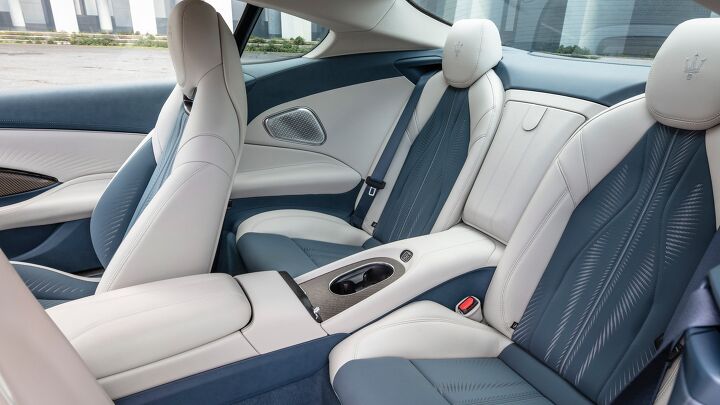
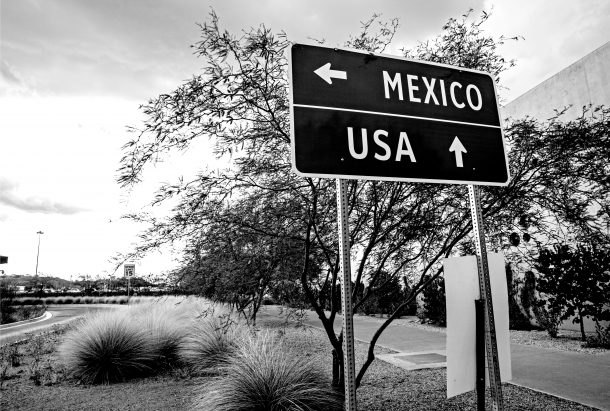
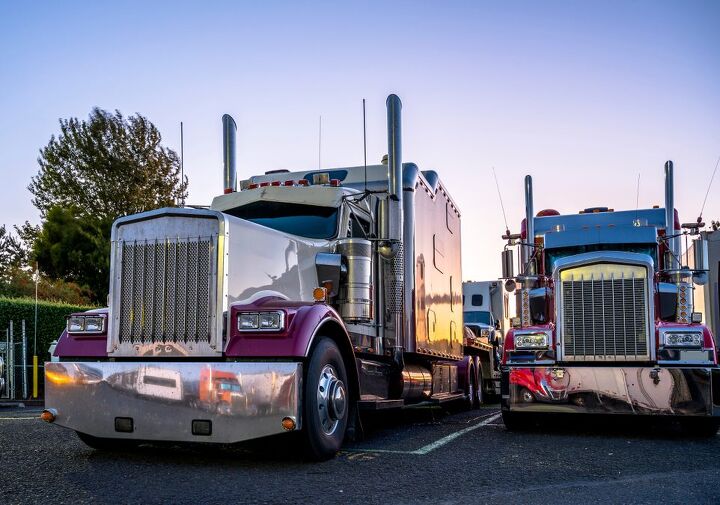




![Auto Lobbyists Attempt to Soften USMCA, Look to White House [UPDATED]](https://cdn-fastly.thetruthaboutcars.com/media/2022/07/19/9146752/white-house-invites-auto-execs-to-endorse-build-back-better.jpg?size=720x845&nocrop=1)

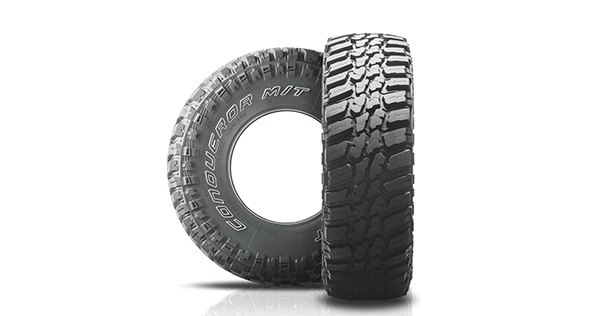

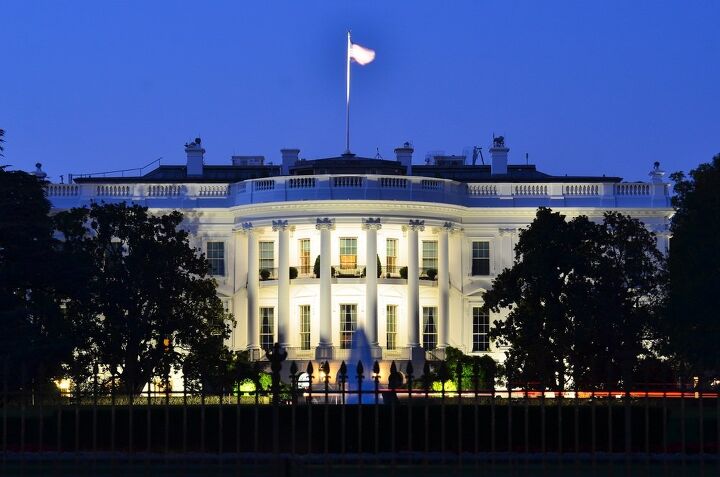
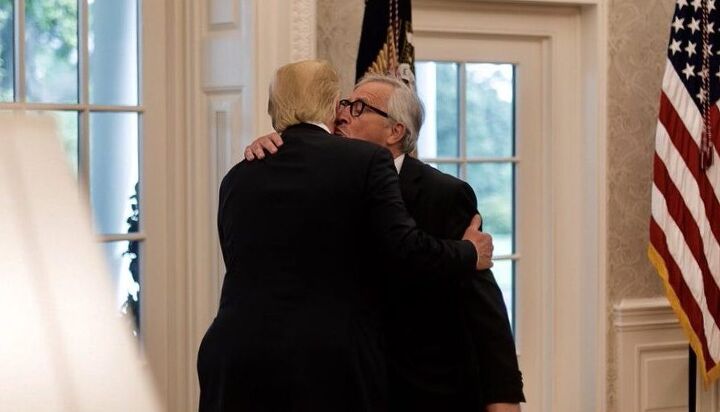









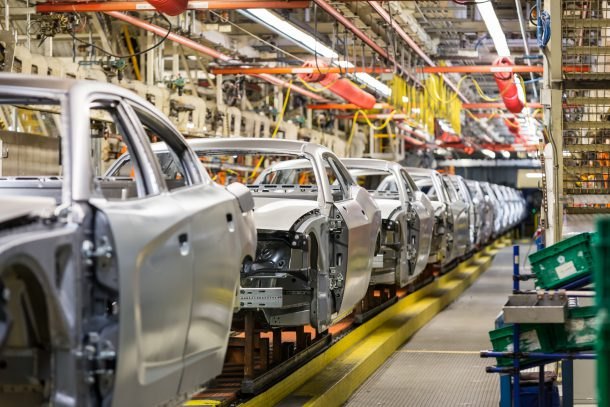
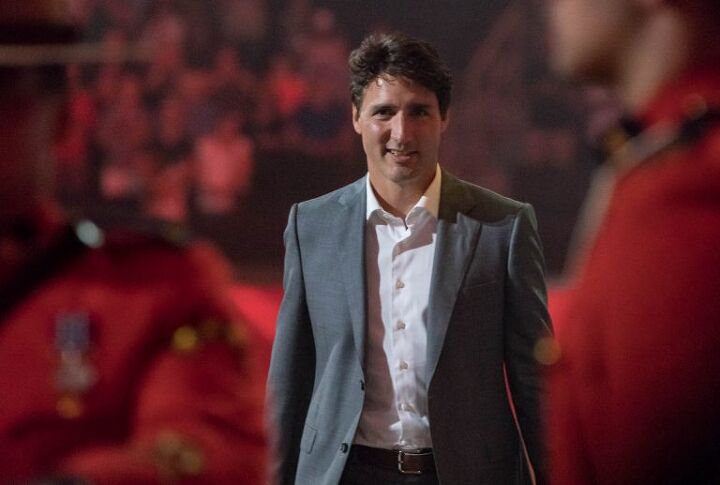


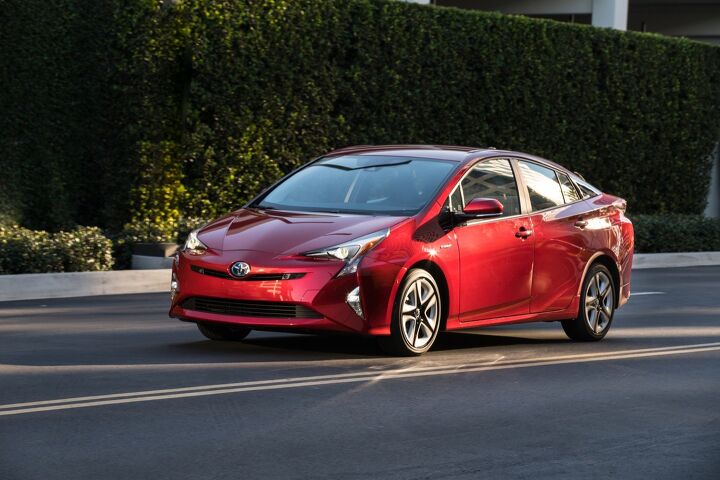
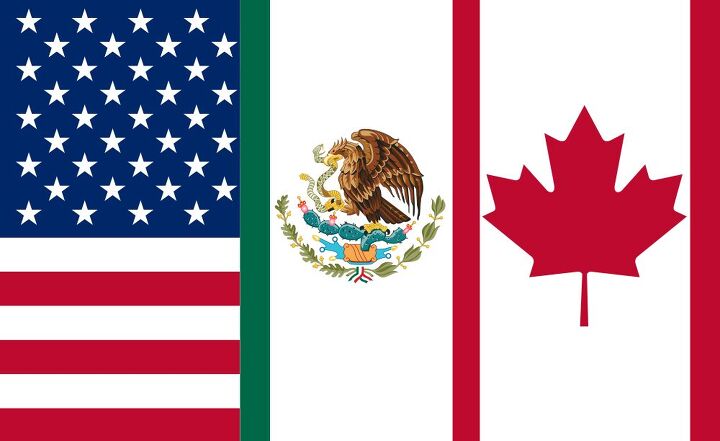

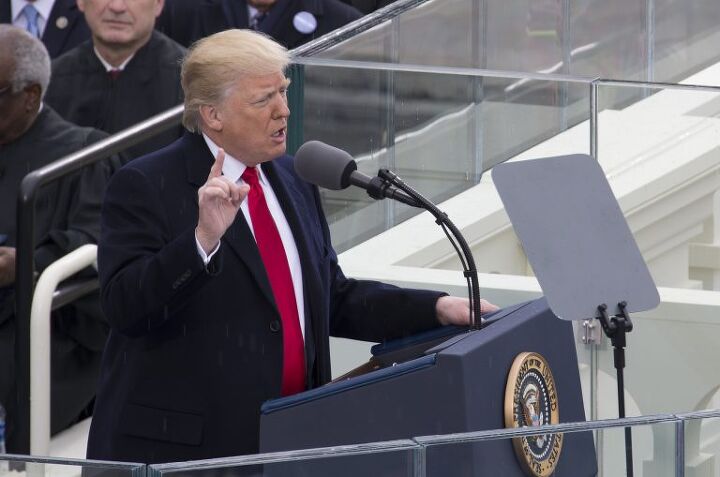
![NAFTA No More: U.S. Reaches Deal With Mexico, Puts Pressure on Canada [Updated]](https://cdn-fastly.thetruthaboutcars.com/media/2022/06/30/8798011/nafta-no-more-u-s-reaches-deal-with-mexico-puts-pressure-on-canada-updated.jpg?size=720x845&nocrop=1)

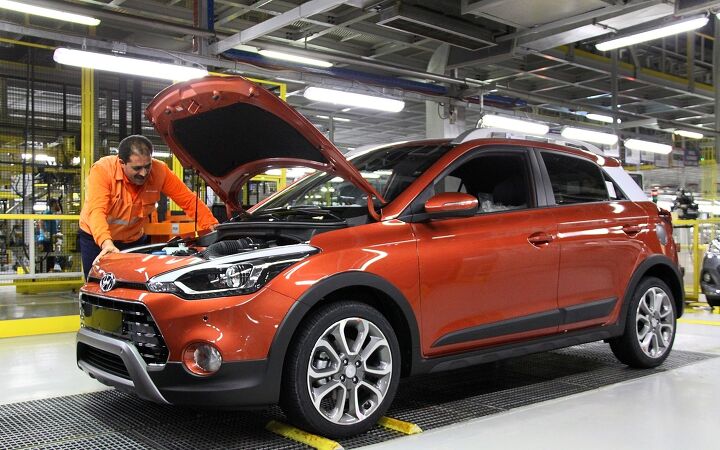
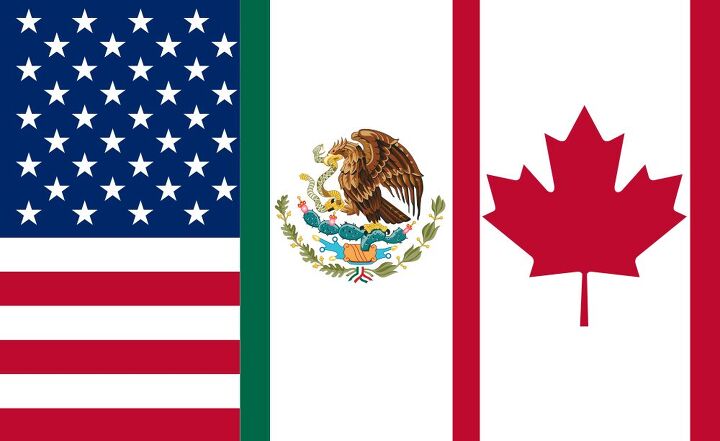




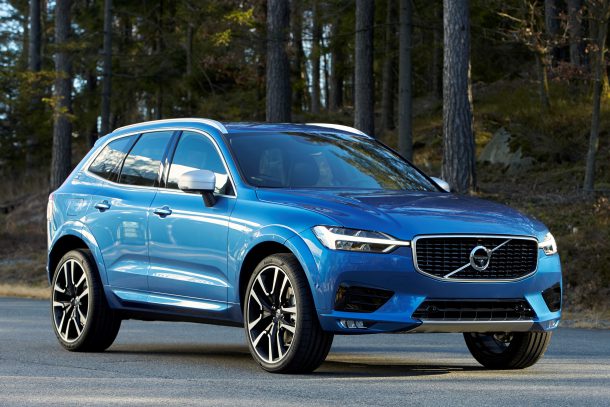


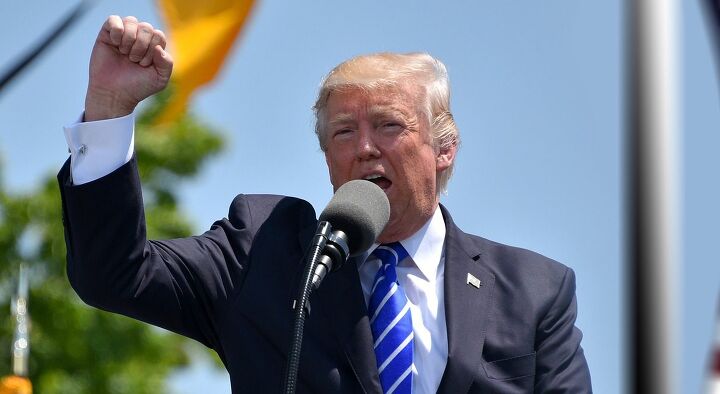

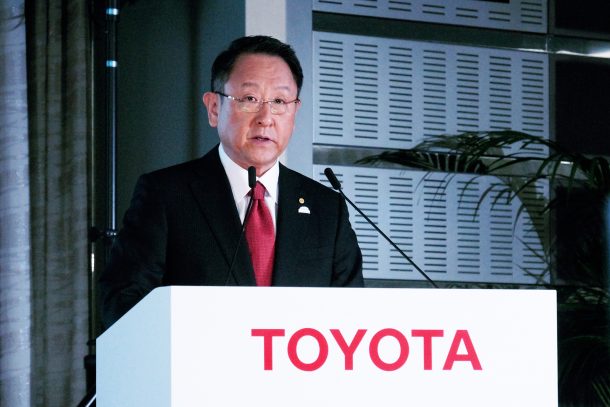
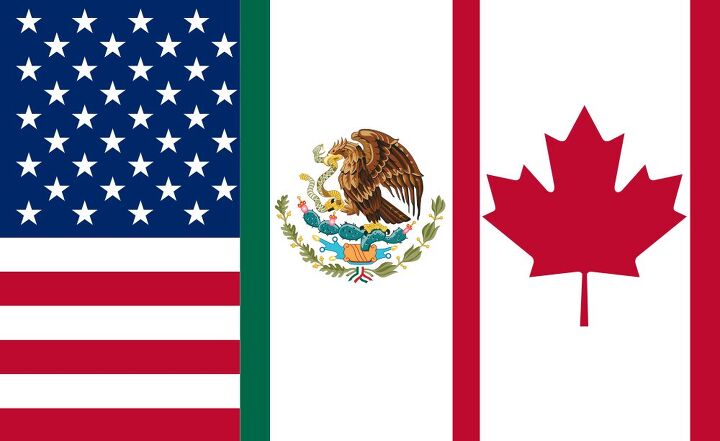
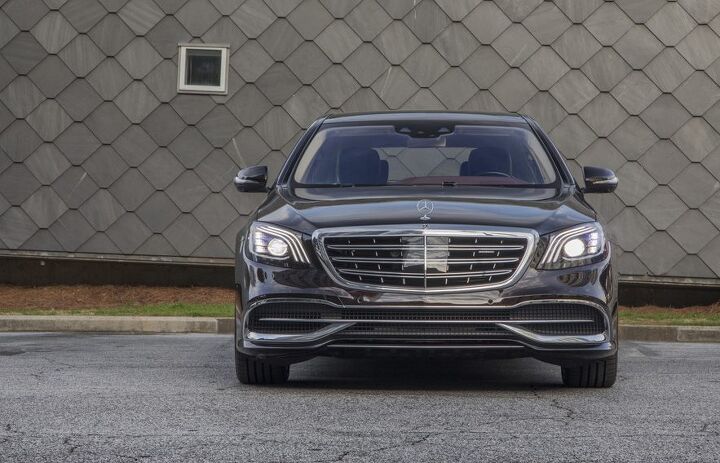




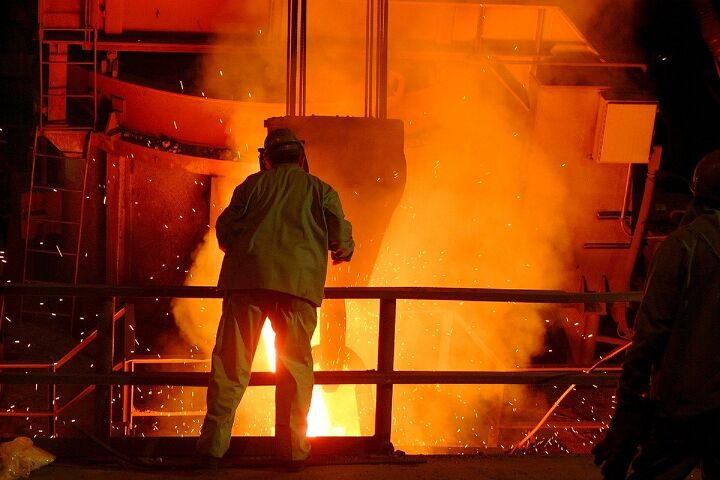


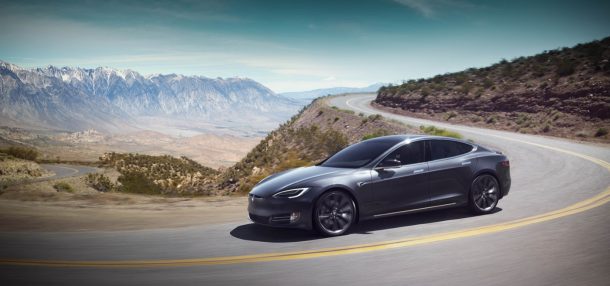
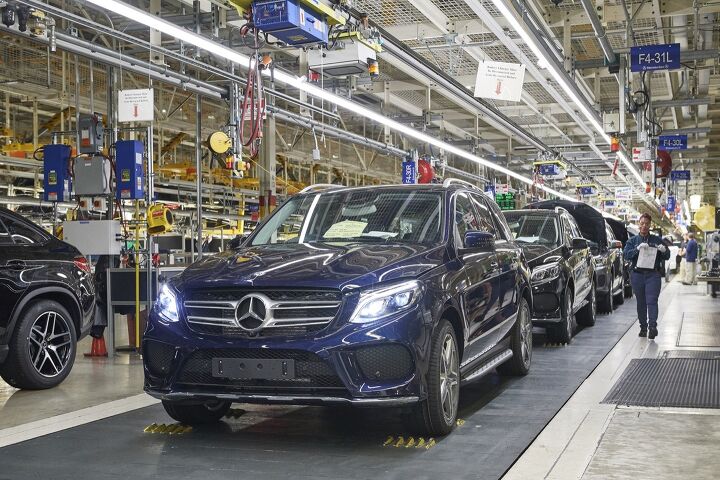












Recent Comments